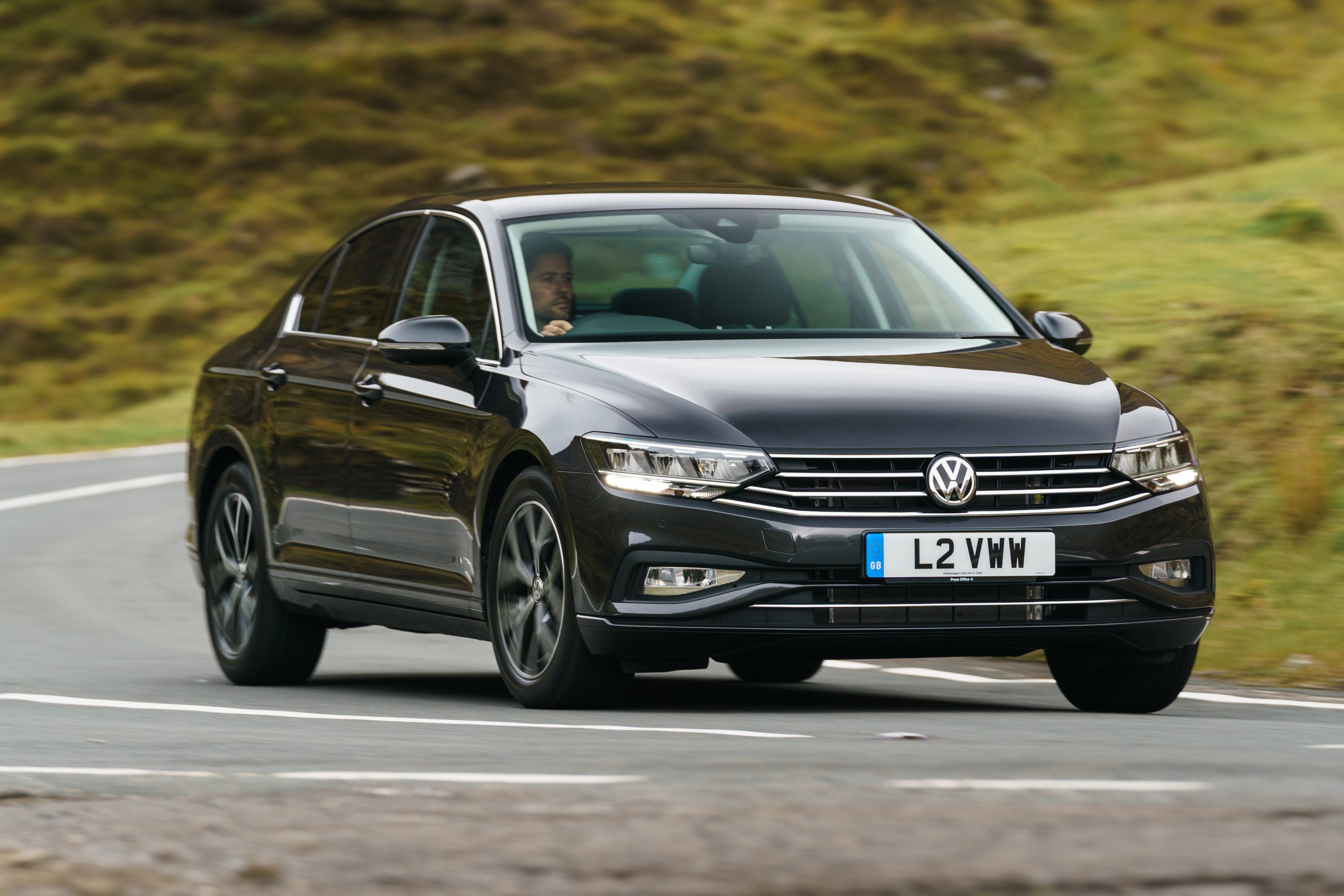Volkswagen Passat (2015-2024) Review
Written by Andrew Brady
Quick overview
Pros
- Sharp, neat, but understated styling inside and out
- Good choice of economical petrol and diesel engines
- Spacious, smart interior and a large boot, even in saloon guise
Cons
- The boot is big, but not as easily accessed as hatchback rivals
- Higher-spec models venture into premium saloon territory
- The estate version is a more capable all-rounder
Overall verdict on the Volkswagen Passat
"The Volkswagen Passat is a superb all-rounder that manages to look and feel a cut above rivals such as the Ford Mondeo. In fact, it's best considered in the same breath as the Audi A4 and BMW 3 Series."
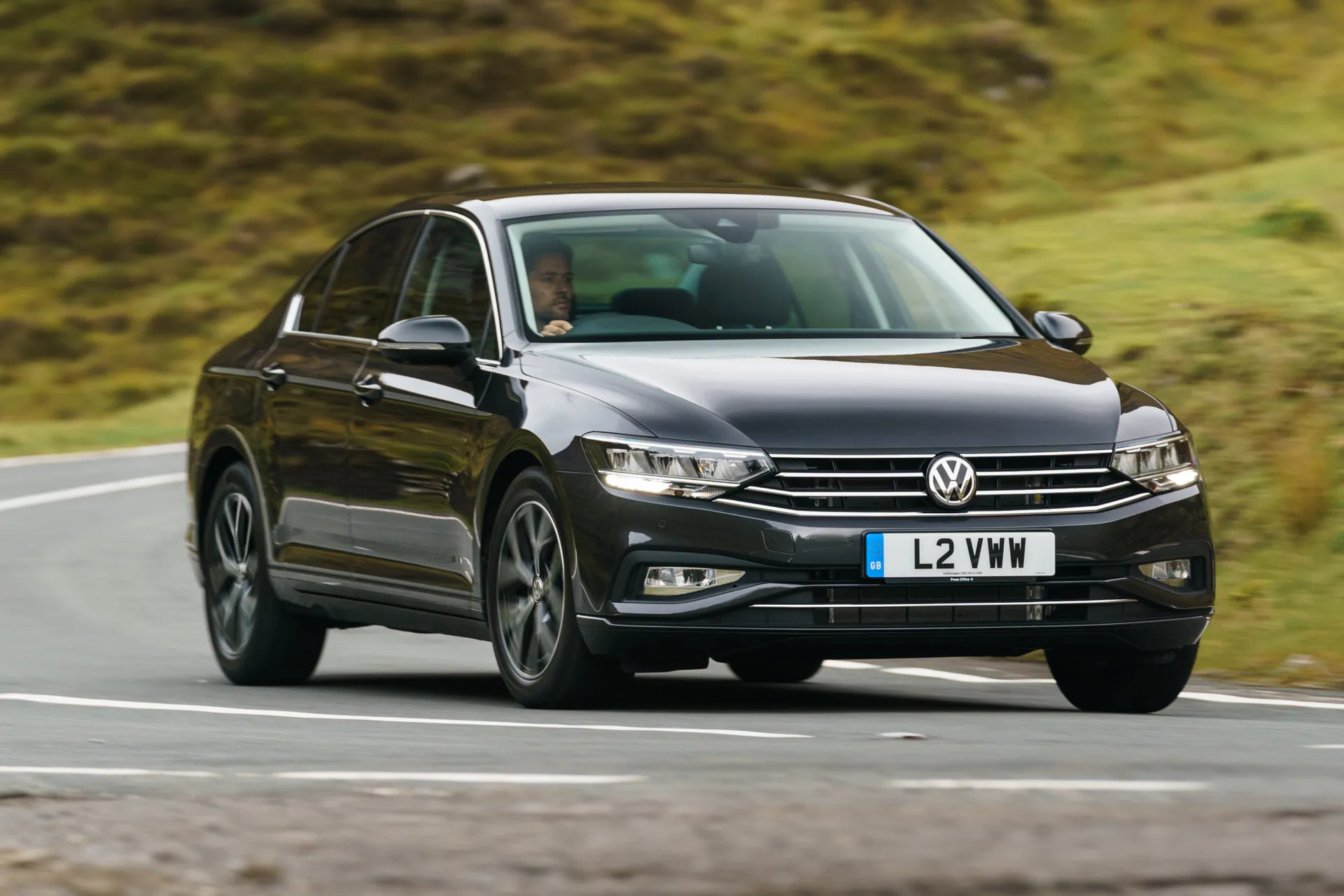
The Volkswagen Passat exemplifies how the German company has carved an enviable position above its mainstream rivals, pitching its models between the once dominant, high-volume 'normal' marques and those premium brands.
That means you’re as likely to reference the BMW 3 Series, Mercedes-Benz C-Class or even the Passat’s close Audi A4 relation, as you might the Ford Mondeo and Vauxhall Insignia, when considering the Passat.
This Volkswagen Passat was originally introduced in 2015, when it quickly won the prestigious European Car of The Year award. It was substantially overhauled for the 2020 model year with a revised engine line-up, plus improved technology and connectivity. The Passat is available as a saloon, as reviewed here, as well as a handsome, usefully spacious Volkswagen Passat Estate, and as a plug-in hybrid model - the Volkswagen Passat GTE - as both saloon and estate model.
Being a big-selling mainstay in the Volkswagen model line-up it’s offered with a wide range of engines and transmissions, with a choice of three petrol engines of 1.5 and 2.0-litre capacities with outputs spanning from 150PS up to 272PS.
The diesel engine range offers even more choice, with four power outputs from the 1.6 and 2.0-litre capacities, from 120PS to 240PS. There’s the option of either a six-speed manual transmission, or a seven-speed DSG automatic, the majority of the range being front-wheel drive, with the most powerful models gaining Volkswagen’s 4Motion four-wheel drive system.
The revisions for the 2020 model year didn’t just bring under the skin changes to improve economy and emissions, but also sharpened up the VW Passat’s already handsome looks, while adding a more comprehensive offering of safety equipment, as well as standard fitment of Volkswagen’s Travel Assist, which allows the Passat to drive at speeds of up to 130mph (where allowed) in a partially autonomous mode.
The saloon’s trim levels start with the SE, followed by the SE Nav, SEL, and R-Line. The saloon marketplace is in decline, with competition for buyer’s money from estate cars and SUVs diminishing their appeal, but the Passat remains an appealing prospect, however unfashionable or not the regular saloon might be considered in the current marketplace.
As a foil to the too-obvious premium players the Volkswagen Passat exudes a surprising amount of class, which is a sizeable part of its appeal, as is its neatly designed, spacious interior.
Spacious, comfortable, considered and classy, there’s a lot to like about the Volkswagen Passat, enough indeed to consider it very worthy of rivalling premium contenders. Not exciting, admittedly, instead the Passat is deeply satisfying, which is arguably more appealing in your daily driver, which makes it easy to recommend here.
All the car you could really want or need, the Passat is a fine all-round choice for the family or business buyer, or a combination of both.
Looking for a used car for sale? We've got 100s of Volkswagen Approved Used Cars for Sale for you to choose from, including a wide range of Volkswagen Passats for sale. If you're looking for the newer version, you need our Volkswagen Passat review.
Is the Volkswagen Passat right for you?
It’s difficult to argue against the Volkswagen Passat. The saloon car might not be the most on-trend bodystyle in the car showroom these days, but its endured regardless, and the Passat underlines why. It’s a classy, understated family car that goes about its business effortlessly, with a spacious interior and sizeable boot.
It’s bigger inside than most of its premium alternatives, makes the interiors of its mainstream rivals look a bit shoddy in comparison, and while it’s not an SUV, neither are you paying for a lot of four-wheel drive hardware, to buy, and run, that you don’t really need. We reckon anyone, and we mean absolutely anyone, would be delighted to have a Passat, it’s that good an all-rounder, even here in saloon guise.
What other cars are similar to the Volkswagen Passat?
Occupying the middle ground between the mainstream and premium makers the Passat has a broad mix of rivals, from the Ford Mondeo to the BMW 3 Series and everything around and between them.
Perhaps the closest brand match that spans both categories like Volkswagen would be Volvo, with its Volvo S60 saloon, with the Mazda 6 also a little bit of a cut above the humdrum, too, again without quite being elevated to premium status. If you want premium feel and even more space, a Skoda Superb is also well worth considering – it’s vast inside.
Also worth considering is the latest Vauxhall Insignia Grand Sport, which while not offering a premium badge comes loaded with standard kit and drives just as nicely as the Passat. If a premium badge does matter, though, consider the Audi A4 and Mercedes C-Class, too.
Comfort and design: Volkswagen Passat interior
"The Volkswagen Passat achieves its convincing stature in the near premium marketplace thanks in no small part to its design."
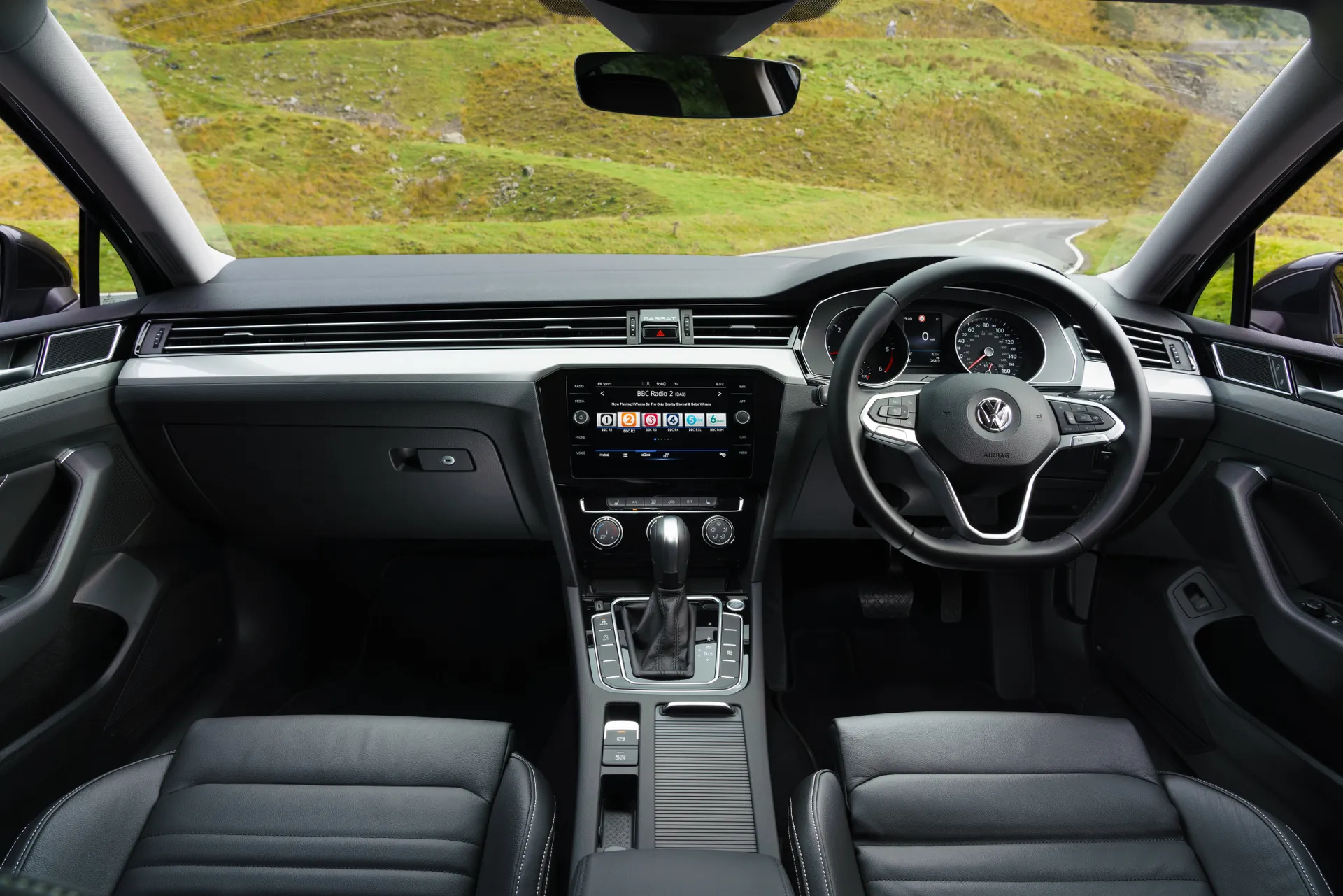
The interior of the Volkswagen Passat is a key part of the reason it can be considered as a bridge between mainstream and premium models.
While there’s little in what could be described as flair, the cabin demonstrates a considered, elegant style that will appeal to its intended wide audience, and it's unlikely to age as much as more flamboyant designs. It’s not as overt as some mainstream competition then, which is to the Passat’s enormous credit.
It’s pleasingly styled, the air vents looking like they span the entire width of the dashboard, while the simple design of the instruments - assuming you’ve not optioned the full digital instruments as part of the Discover Navigation Pro - make them very crisp and clear. That neat design encompasses the seats, which not only look good, but provide excellent comfort and support.
From base level SE trim the driver and front passenger seats have height adjustment, with the driver’s seat also benefitting from seat cushion tilt adjust, thigh support and an electrically adjusted backrest. SEL models gain seat heating in the front seats, while the upholstery and the steering wheel and gear knob are covered in leather. All VW Passats have a rake and reach adjustable steering column, too.
Manual air conditioning as standard across the range, with R-Line gaining three-zone electronic climate control, this available optionally with other trim levels. Keyless entry is also a standard feature with R-Line specification, again, this can be optioned on all. Other comfort-orientated cost options include a heated multi-functional steering wheel and a 14-way electrically adjustable driver’s seat with massage and memory function.
Quality and design
It is not just the Volkswagen Passat’s fine looks inside and out that make it a credible premium alternative, but the material quality throughout. It looks its best in its higher trim grades, with SEL required to have standard leather upholstery, but even the fabric covered seats look good and feel like they’ll wear very well.
The centre console and touchscreen design is neat, while the analogue instruments are swapped out for a digital screen that’s configurable. Doing so really lifts the Passat’s interior to another level, but at £2,200 it should do. Later on in the car's life, this was offered as standard equipment on higher trim levels, however.
Overall, while newer rivals offer a slightly fresher-looking interior design, the Passat's fit-and-finish remains up there with the very best. You feel as if you're in a higher class of car than you actually are.
Infotainment: touchscreen, USB, nav and stereo in the Volkswagen Passat
No version of the VW Passat feels basic, and the infotainment systems are a reflection of that.
The standard infotainment offering on the SE includes a 6.5-inch touchscreen connected to an eight-speaker stereo system featuring Wireless App Connect smartphone mirroring via Apple CarPlay, Android Auto and MirrorLink. SE Nav gains a larger 8.0-inch touchscreen, with Bluetooth connectivity, sat nav, SMS functionality and twin smart device pairing. SEL gets all that, plus DAB radio and voice activation.
None of the saloons got the range-topping Discover Navigation Pro (the R-Line Edition estate only model and GTE Advance plug-in hybrids do) as standard. It’s a £2,200 option, which adds a 9.2-inch touchscreen, with voice control 3D mapping, a 64GB SSD hard drive, the Discover Navigation Pro also sees the conventional instrumentation being replaced by a 10.25-inch high resolution TFT screen which Volkswagen dubs Active Info Display.
It offers five different viewing modes, allowing you to customise your instruments, reducing the size of the dials, have a large mapping screen or the status of the assistance systems displayed.
Later on in the car's life, and most recently in facelifted versions, the standard infotainment offering was further improved. Base versions are called SE Nav, which as the name suggests means sat-nav is standard, as is DAB radio.
All the touchscreens, from the 6.5-inch one to that range-topping Discover Navigation Pro one all work with ease, Volkswagen sensibly keeping functions like ventilation controls separate to those within the screen, while there’s an easy home and menu button. Of the three choices, the middle 8-inch option is the best choice, unless you’re determined to have that TFT instrumentation. A head-up display is optional in SEL models and above, too.
Space and practicality: Volkswagen Passat boot space
Up front in the VW Passat there’s plenty of space for a pair of taller adults, and likewise the rear seats offer head and legroom that’ll accommodate large adults comfortably.
That’s two adults, the middle seat not being particularly comfortable without any contouring to the seat itself, while the raised floor and positioning of the rear air vents reduces leg and foot room in the middle. That’s true of the majority of its saloon rivals though, and for all the other passengers the Passat offers a very spacious cabin. A pair of ISOFIX child seat mounts are located on the outer rear seats, and, usefully the rear doors open widely to give good access to the them.
There are good-sized, and lined, door bins in both the front and rear doors, all able to accommodate a bottle, while there’s a pair of cup holders between the front seats under a sliding cover. There’s a lidded, deep cubby behind that as well as a recess alongside, while there’s also an area in front of the gear selector that’s perfectly shaped to accommodate a smartphone, it also conveniently located to a USB-type socket (this needing a USB adaptor which Volkswagen provides).
A good-sized lockable glovebox adds more oddment storage, as does a small lidded compartment on the driver’s side lower dashboard. The front seats in all come with map pockets in the seatbacks too.
The boot is a good size and shape, there 586 litres of boot space with the rear seatbacks up, though the seats do drop forward in a 60/40 split (the estate getting a more useful 40/20/40 split) to create 1,152 litres of luggage capacity. The VW Passat’s biggest limiting factor in relation to practicality is the fact it’s a saloon, opposed to a hatchback, meaning that accessing that sizeable boot area isn’t as easy as in some rivals. If you need better access to the boot, then buy the estate.
In terms of exterior dimensions, the Volkswagen Passat is 4,767mm long, 1,832mm wide (without mirrors) and 1,782mm tall. That makes it smaller than large family cars such as the Ford Mondeo and Vauxhall Insignia Grand Sport, and slightly larger than premium saloons such as the BMW 3 Series. It's nearly identical in size to the Audi A4, which is not surprising given the two cars share underpinnings.
Handling and ride quality: What is the Volkswagen Passat like to drive?
"Not sporting, but agile enough for a big saloon, the Volkswagen Passat isn’t going to thrill behind the wheel like a BMW 3 Series, but nor is it meant to. Instead, it strikes a great all-round balance between handling and refinement."
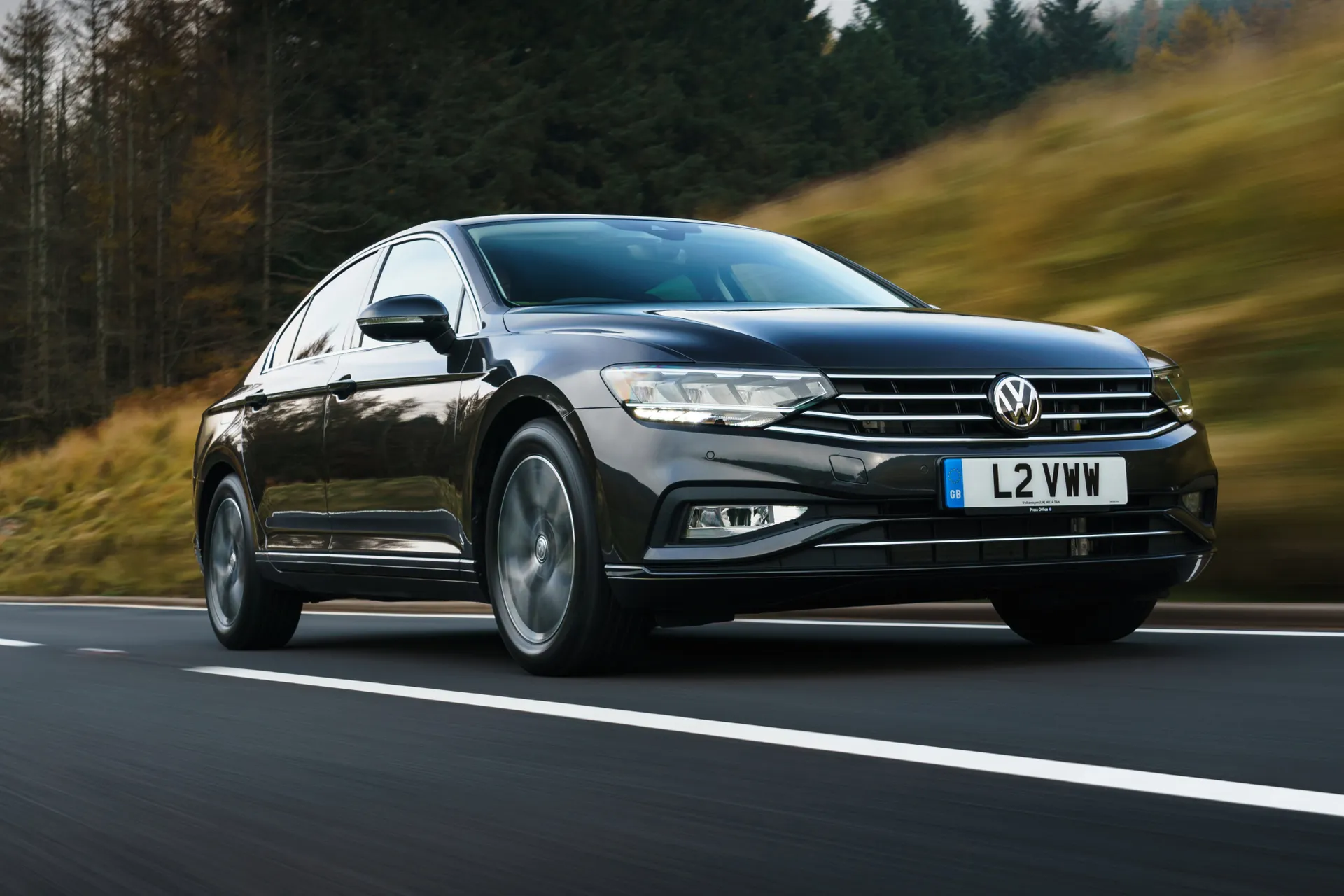
The Volkswagen Passat is designed to make long, arduous motorway drives as relaxing as they possibly can be. So while comfort is a clear focus, it's perfectly competent in terms of handling.
The suspension provides excellent comfort and isolation allied to decent control in corners. It's best with the 17-inch alloy wheels; larger 18-inch wheels, from R-Line upwards, or cost optional wheel sizes up to 19-inches do impact on the ride comfort negatively, though not to the point of distraction. Volkswagen does offer the option of sport suspension, which comes as standard on the R-Line, which lowers the ride height by 15mm and adds a bit of unwelcome busyness to the ride. It's hardly uncomfortable, though.
There’s also the cost option of Dynamic Chassis Control across the entire line-up, offering a choice of suspension settings of Comfort, Sport, Individual and Normal.
We’re not convinced you need to spend any extra on the Passat’s suspension, unless you want an R-Line to ride a bit softer. The SE and SEL ride fluently and comfortably on the Passat’s standard set-up. The variable DCC set-up adds choices you’ll not really need, and, you’ll likely end up driving everywhere in Normal mode, Sport only adding unwanted brittleness to the ride.
The majority of Passats are front-wheel drive, with 4Motion four-wheel drive on the highest power output models. The 4Motion improves traction on damp or slippery surfaces, and for those wanting a tow car it’ll aid stability, but it doesn’t add any additional engagement behind the wheel.
Volkswagen offers the option of an XDS electronic differential lock on all models, which improves traction and handling. It's an inexpensive - £205 – option that’s worth having if you want to sharpen up the agility of your Passat. Competent, if a bit unexciting, the Passat’s a fine all-rounder.
What engines and gearboxes are available in the Volkswagen Passat?
With a range of petrol and diesel engines and a plug-in hybrid choice, the Volkswagen Passat saloon has a good selection of engines. None of them feel out of place, or are a weak link.
The petrol line up of the latest VW Passat comprises of 1.5-litre and 2.0-litre TSI turbocharged four-cylinder engines, the entry-level 1.5 TSI EVO having 150PS and 250Nm of torque. The 2.0-litre TSI ups the Passat’s power to 190PS, with torque increasing too, to 320Nm, while the 272PS 2.0-litre TSI engine is limited to a single, estate-only model.
Earlier versions of the Passat had a 1.4 TSI petrol engine, which in entry level form puts out 125PS. We'd recommend stepping up to the 150PS version of that same engine, though, as it doesn't need to be worked as hard to get about. All of the petrol engines are smooth, and while they’ve not got the surfeit of torque of the diesels, they’re still capable all-rounders, even the 1.5-litre entry-level choice.
The diesel range is introduced with the 1.6-litre TDI with 120PS, the 2.0-litre TDI above it having 150PS and 340Nm of torque, and another version above it coming with 190PS and 400Nm. The diesel range is headed by a 2.0 BiTDI twin-turbodiesel putting out 240PS and 500Nm of torque. To be honest, the 150PS 2.0-litre TDI is all you need unless you plan on towing or regularly lugging heavy loads. It's not the quietest diesel engine around, but it is strong, smooth and impressively efficient.
All but two Passat saloon versions are front-wheel drive, with the 240PS turbodiesel coming as standard with 4Motion four-wheel drive, and the 190PS 2.0 TSI available with either front, or that 4Motion four-wheel drive. Those 4Motion cars and the 190PS TSI in front-wheel drive are only offered with the 7-speed DSG automatic, with the rest of the line-up having a choice of either it, or a six-speed manual.
That manual is slick and easy, and while the DSG ups the convenience, it can be a bit hesitant when pulling out of junctions or onto roundabouts.
The auto-only VW Passat GTE plug-in hybrid mates the 1.4 TSI petrol engine with an electric motor. It puts out a stout 218hp, and can run for about 25 miles or so on electric-only power. It's not quite as good as the latest crop of plug-in hybrids - in particular the excellent BMW 330e - but it makes a great used buy.
Refinement and noise levels
Again, this is another area where the Volkswagen's Passat’s premium feel is apparent. It’s quiet inside, with that calm hush making the Passat a very able, relaxing long-distance proposition. There’s very little wind noise at UK road speeds, while road noise is nicely contained too, though pick larger wheel options and rougher surfaces will result in a bit of noise from the tyres.
The petrol engines are quieter than their diesel counterparts in normal driving. You'll still hear them if you're in a hurry, but the background hum of the diesel engines is certainly more obvious at ordinary speeds.
The GTE plug-in hybrid, with its electric-only mode, is all but silent inside unless you wake the petrol engine. Then, for all intents and purposes, it behaves like a 1.4 TSI petrol engine with a healthy surge of electrical boost.
Safety equipment: How safe is the Volkswagen Passat
The Volkswagen Passat’s standard list of safety equipment is extensive. All versions come with Brake Assist and Electronic Brake Pressure Distribution, a post collision braking system, front and rear passenger curtain airbag with side impact airbag, driver and front passenger airbags, a knee airbag for the driver and rear seat side impact airbags, driver and front passenger optimised head restraints.
There’s Electronic Stability Control, traction control and engine drag torque control, while those who tow with the Passat will appreciate the trailer stabilisation function that detects if any trailer you’re towing starts to sway. A pre-crash warning and preventative system is also standard, as is tyre pressure loss indicator, Adaptive Cruise Control with Front assist, City Emergency Braking, a Driver Alert System, automatic headlights, Travel Assistant, Lane Assist, parking sensors and Traffic Jam Assist.
In short, the VW Passat is very well equipped in relation to safety as standard. Volkswagen’s available option in relation to safety being the possibility to upgrade the tyre pressure loss indicator to a more comprehensive Tyre Pressure Monitoring System for just £150 on earlier models.
Independently crash tested by Euro NCAP back in 2014, the VW Passat scored a maximum 5 star overall result, and since its 2019 refresh it’s gained additional safety aids. The Passat is fitted with two Isofix child seat mounts in the rear.
MPG and fuel costs: What does a Volkswagen Passat cost to run?
"The most efficient diesel Volkswagen Passat models return more than 60mpg in official WLTP fuel economy tests. The petrols aren't too bad either, while the sky-high claimed figure of the PHEV is dependent on plugging it in."
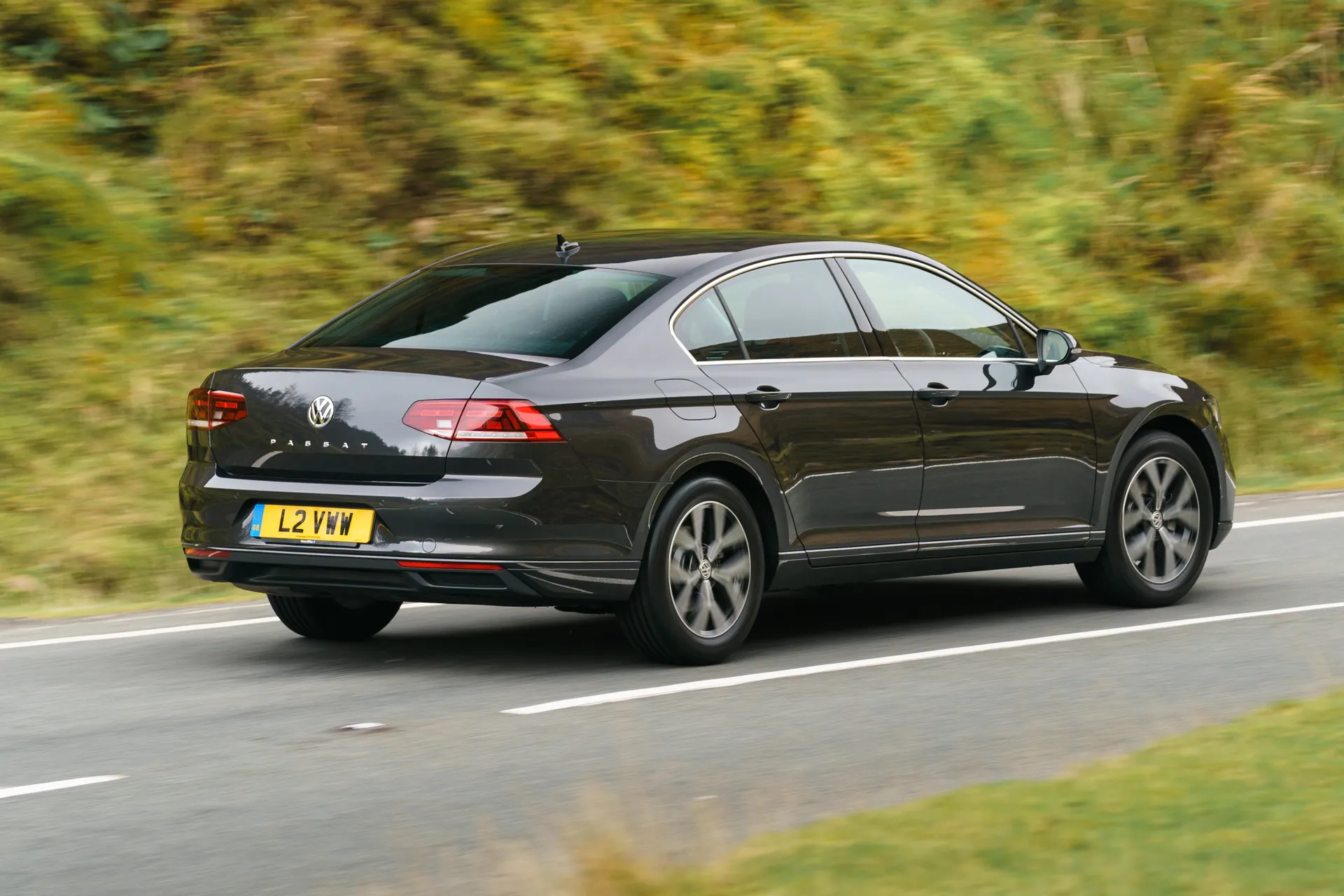
The Volkswagen Passat has a range of engines that'll deliver over 60MPG at the most frugal diesel end, and closer to 30MPG for the most powerful petrols.
Both the 1.6 and 2.0-litre diesel are capable of that 60MPG figure at a constant 70mph motorway cruise, although the more powerful models sacrifice that slightly, and the four-wheel drive variants more so.
In terms of the petrol engines, even the 1.5 TSI petrol is fairly economical, officially returning around 44-45mpg (depending on trim level and gearbox). The earlier 1.4 TSI petrol isn't quite as fuel sipping, but 40mpg is a realistic overall figure.
The VW Passat GTE, with its PHEV (plug-in hybrid) powertrain, needs explaining. Although a claimed figure of over 200mpg sounds incredible, you'll only achieve that if you can run in electric power for the vast majority of your journey. With a real-world EV range of about 25 miles, that means short journeys followed by charging up the battery at home. If you're on long journeys using predominantly petrol power, or cannot charge the battery, expect a figure of about 40-50mpg.
How reliable is the Volkswagen Passat?
Volkswagen managed to squeeze into the top 10 brands in the latest HonestJohn.co.uk Satisfaction Index. That's a strong showing, reflecting that improvements have been made over the last few years.
That doesn't mean there hasn't been issues with the Passat over its lifetime, however. DSG gearboxes have been known to occasionally fail prematurely, and on older or higher mileage models its worth ensuring a fluid change is done. Check all the electrical components work, and on models with the panoramic roof fitted ensure there are no leaks. Happily, the Passat's engines and mechanicals are well-proven.
Insurance groups and costs
The ABI insurance groupings for the Volkswagen Passat span a wide range, thanks to the differing cost and performance potential of the line-up.
The 1.6 TDI diesel is in the lowest grouping for the Passat, it being 15E in SE trim, with the rest of the Passats typically falling into group 20 through to group 25, with only the R-Line, 4Motion 190 and 240 diesels being any higher, in group 26E and 32E respectively. All come with a three-year, 60,000 mile warranty as standard. Volkswagen offers fixed price servicing, too.
VED car tax: What is the annual road tax on a Volkswagen Passat?
Low emissions and good residuals make the VW Passat a fleet favourite, with the lowest emitting Passat putting out just 124-133g/km of CO2. Only one Passat in the saloon range exceeds the £40,000 threshold for a higher (for five years) £325 annual charge after the first year’s payment.
Only the latest (2021-on) Passats are RDE2 compliant, so the first year VED will be between £215 and £1,305, with that highest rate relating to the 4Motion 240PS turbodiesel. The bulk of Passats will cost between £215-£540 to tax in their first year, and £150 a year thereafter.
How much should you be paying for a used Volkswagen Passat?
"With loads of supply there's plenty of used VW Passats to choose from. Many have been in the hands of business users, which usually means high mileage, although as long as they're looked after this shouldn't be an issue. "
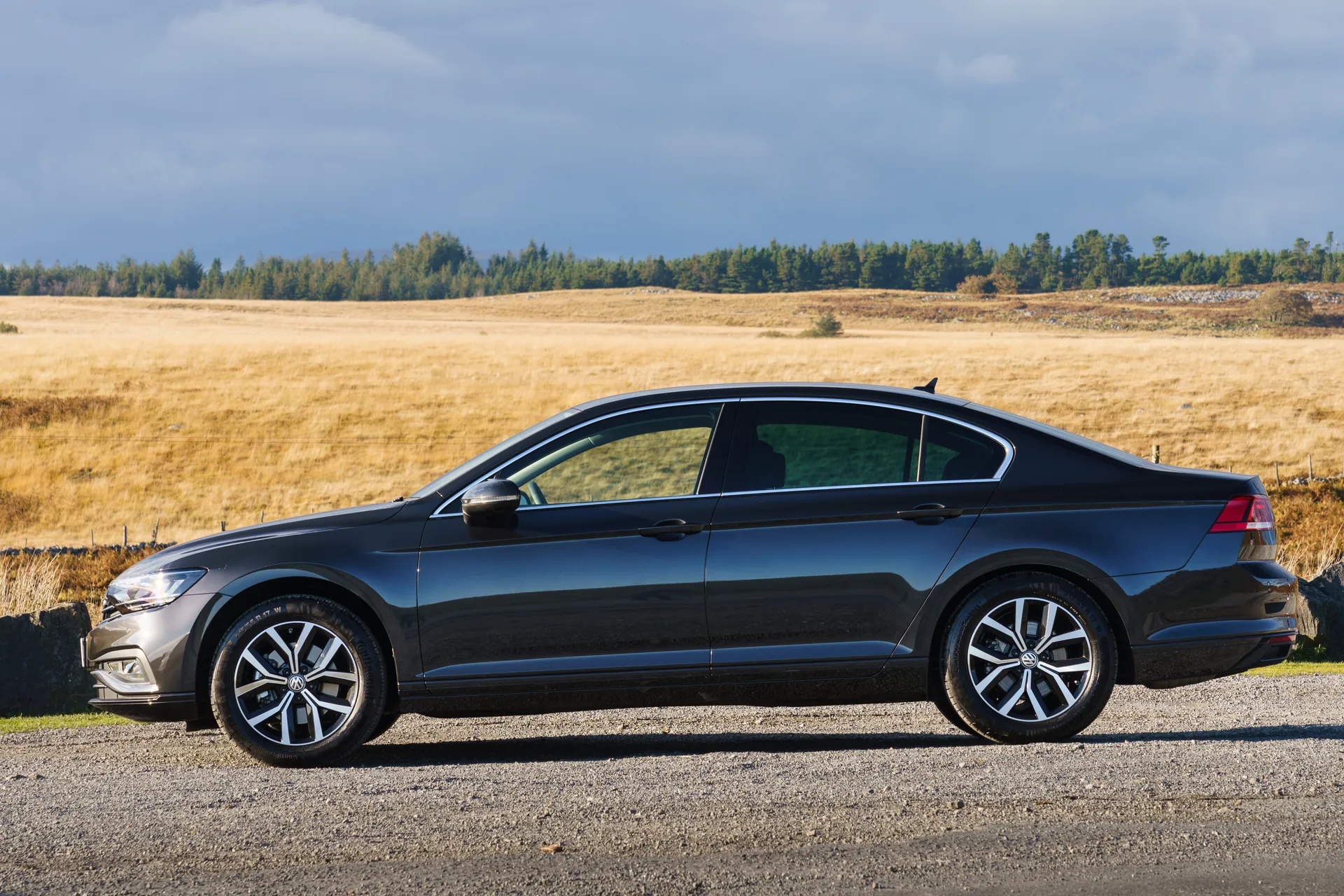
Prices for the Volkswagen Passat start at under £6000 if you’re happy to have one with over 140,000 miles on the odometer, of which there are a lot, as the Passat is a popular car for business drivers.
The bulk of used choice is of 2.0 TDI and 1.6 TDI diesel engines. If you want one with reasonably low mileage, expect to pay around £10,000 for a 2015 1.6 TDI SE Business with 60,000 miles on the clock. There's less petrols on the market, but a 2018 1.4 TSI 150 in GT trim with 50,000 miles is £15,000.
There’s loads of choice from £15,000 upwards, so you can afford to be picky, right up to nearly new £30,000+ models and delivery mileage stock that’s on Volkswagen dealership forecourts.
Trim levels and standard equipment
All Volkswagen Passat's come comprehensively specified, with air conditioning, alloy wheels, Apple CarPlay and Android Auto, and safety equipment on all being particularly impressive.
SE is the entry into the range. SE Nav adds satellite navigation and a larger 8-inch touchscreen with greater functionality, while SE Business is similarly equipped and aimed at, as the name suggests, business users.
SEL adds a DAB tuner, leather covered seats, steering wheel and gear knob and remote electrically heated adjustable and foldable door mirrors. R-Line gains sports suspension, an R-Line styling pack, 3-Zone climate control, keyless entry and larger 18-inch alloy wheels.
Ask the heycar experts: common questions
What is the best VW Passat to buy?
Is the VW Passat a good car?
Is the VW Passat discontinued?
Get our latest advice, news and offers
Keep me updated by email with the latest advice, news and offers from heycar.
By submitting you agree to our privacy policy
